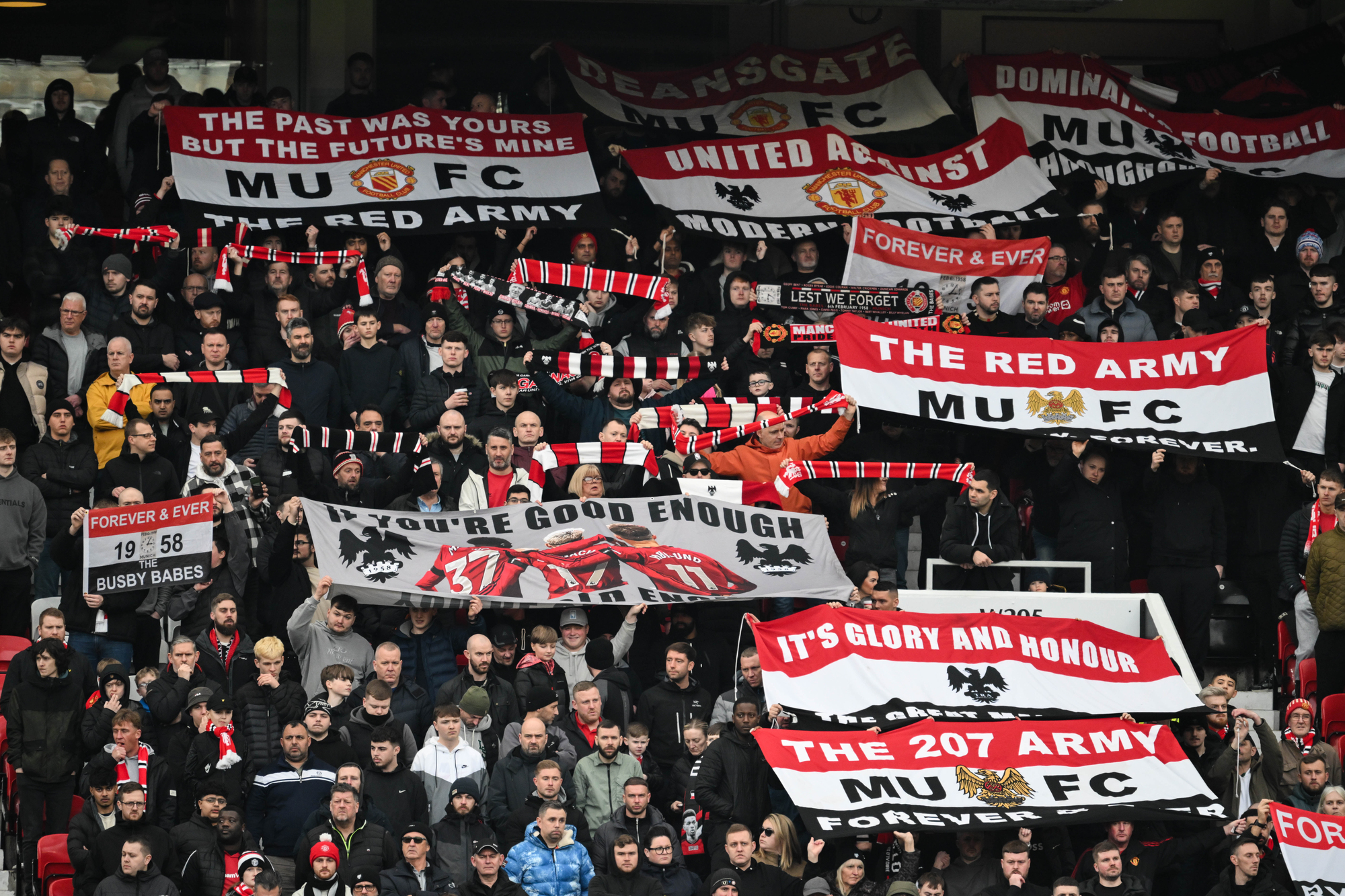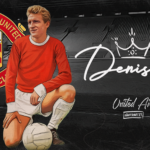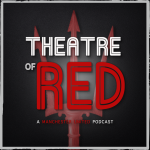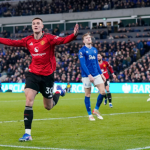Fan culture has undergone a profound transformation in English football from the early 1970s to the present, evolving from a period marked by intense tribalism and violence to one characterised by commercialism, diversity, and global engagement.
We will attempt to capture the changing nature of football fandom, with a particular focus on one of the most iconic and widely supported clubs in the world, Manchester United.
Through the decades, the Reds fan culture has mirrored broader trends within the English game, reflecting the sport’s shifting social, economic, and cultural landscape.
Today, despite decades of mismanagement at the highest level, the 20-time English champions continue to captivate a market-leading audience at home and abroad.
Football Hooliganism
The 1970s were a turbulent decade for the game, marked by the rise of hooliganism – a phenomenon that cast a dark shadow over the sport.
Fixtures often became battlegrounds for rival fan groups, known as firms, who engaged in violent confrontations inside and outside stadiums.
With its large and passionate supporter base, Manchester United was at the epicentre of this trend with the notorious Red Army.
The hooligan culture was fueled by a combination of social factors – including economic decline, youth disenfranchisement, and a sense of alienation in working-class communities.
For many young men, football violence offered a sense of identity and belonging, as well as an outlet for their frustrations. Fixtures were regularly marred by everything from pitch invasions to clashes with police and confrontations with rival supporters.
Despite the violence, the 70s also witnessed the emergence of a strong sense of community and loyalty. For the United faithful, attending matches and following the team, home and away, became a central part of their lives.
It has been confirmed to this author on multiple occasions that the relegation suffered by United and the subsequent season in the old second division were some of the best away days that the Reds had ever experienced.
This era laid the foundation for the passionate and devoted culture that would continue to define United in the upcoming decades.
Tragedy and the Push for Change
Despite endless attention, the 1980s began similarly, with hooliganism continuing to plague the English game. However, the tide turned as a series of tragic events highlighted the dangers associated with the sport.
The Heysel Stadium disaster in 1985 and the Hillsborough disaster in 1989 shocked the nation and underscored the urgent need for reform.
While most readers of this article will hold a Manchester affiliation, I would like to emphasise that no supporters, regardless of their team, should ever attend a football fixture and not come home.
For United fans, the decade was also a period of internal strife and external challenges.
The club’s ownership changed hands several times through the late 70s and early 1980s, leading to instability on and off the field. However, the Old Trafford faithful remained steadfast, even as the team struggled to recapture its former glory.
This also saw the emergence of more structured supporter organisations, which sought to improve the matchday experience and promote a positive image.
The tragedies of the decade prompted a rethinking of football culture in England. The government, the Football Association, and clubs themselves began to take steps to address hooliganism and improve safety at matches.
This period saw the beginning of a shift away from the violent, tribal culture of the past towards a more family-friendly, commercially-driven approach to football.
The Premier League and the Commercialisation of Football
Enter a new era for English football with the formation of the Premier League in 1992.
This period was characterised by rapid commercialisation, as television deals, sponsorships, and merchandising transformed the sport into a global entertainment industry.
Under Sir Alex Ferguson, United became the dominant force in England, winning numerous league titles and establishing itself as a global brand.
However, the money-oriented aspect of football resulted in a profound impact on fan culture.
On one hand, it brought new opportunities to engage with the sport, with matches broadcast worldwide and official merchandise becoming widely available.
On the other hand, it also led to the gentrification of football, as ticket prices soared and traditional working-class fans were increasingly priced out of attending matches.
For the Old Trafford faithful, the 90s were a period of immense pride and joy – with success matched by a growing sense of identity and unity among supporters.
The Stretford End became the symbolic heart of United’s culture, known for its passionate support and raucous atmosphere, while the club’s global reach also expanded during this time, with supporters’ clubs springing up in countries worldwide.
However, the commercialisation of football also led to tensions with ownership. The takeover of Manchester United by the American Glazer family in 2005 sparked widespread protests, with fears that the club’s traditions and values were sacrificed in the pursuit of profit.
The ‘Green and Gold’ movement, which saw fans donning the club’s original colours in protest, became a symbol of resistance.
Globalisation and the Digital Revolution
The 2000s saw the rise of the internet, and social media revolutionised supporter engagement, enabling them to follow their teams more closely than ever before, regardless of geographical location.
United’s fan base became increasingly diverse, with supporters around the globe coming together to celebrate their side’s successes.
The club’s official supporters’ clubs grew, and online forums and social media platforms provided new spaces for fans to connect, share opinions, and organise events.
The digital revolution also brought about changes in the way individuals consumed football.
Television remained a dominant medium, but the advent of online streaming services revolutionised computers, tablets, and smartphones.
Social media platforms like Twitter, Facebook, and Instagram became central to the fan experience, providing real-time updates, behind-the-scenes content, and a space to express views.
However, the 2000s were not without their challenges, with the rise of online abuse and toxicity, and individuals using these platforms to target players, managers, and fellow supporters with racist, sexist, and homophobic slurs.
Clubs faced challenges in addressing these issues and ensuring that online spaces remained safe and inclusive for all fans.
Fan Activism and Inclusivity
The 2010s saw a resurgence of fan activism, as supporters across the country began to push back against what they saw as the excessive commercialisation of their game.
Protests against high ticket prices, the increasing influence of television broadcasters, and the perceived disconnect between clubs and their traditional fan bases became more common.
For Manchester United fans, the Glazer ownership remained contentious, with protests continuing throughout the decade.
However, this period also saw the emergence of new forms of engagement, as supporters sought to reclaim their role in the sport. The rise of fan-owned clubs, such as FC United of Manchester, highlighted the desire among sections to return to a more grassroots, community-focused model.
The decade was also marked by a growing emphasis on inclusivity within football fan culture. Campaigns to tackle racism, sexism, and homophobia gained momentum, with clubs, including United, taking a more proactive stance on these issues.
The ‘Rainbow Laces’ campaign, which aimed to promote LGBTQ+ inclusivity in football, received widespread support, and efforts were made to create more welcoming environments for all, regardless of their background.
The end of the decade was also marked by the growing impact of data and analytics in the game.
For fans, this meant greater access to statistics, tactical analysis, and in-depth coverage of matches. Fantasy football and betting also became more popular, changing how individuals engaged with the sport.
The Pandemic, Social Justice, and the Future of Fan Culture
The 2020s began with the global COVID-19 pandemic, resulting in matches being played behind closed doors, and fans were forced to engage with the sport in new ways.
Virtual watch parties, social media interactions, and online fan forums became essential to maintaining a sense of community and connection.
For Manchester United, the pandemic highlighted the resilience and the challenges of modern fan culture.
The absence of supporters underscored their vital role in creating an atmosphere that makes football so special. At the same time, the financial impact of the pandemic raised questions about the sustainability of the current model.
As feet returned to stadiums, the decade saw renewed social justice activism. The Black Lives Matter movement, which gained global prominence in 2020, had a significant impact on football, with players taking the knee in solidarity with the fight against racial injustice.
Looking ahead, the future of football fan culture in England, particularly at Manchester United, is likely to be shaped by several key trends.
The continued globalisation of the sport will bring new challenges and opportunities, as clubs seek to balance the demands of a global fan base with the needs of their local supporters.
The rise of technology and data will continue to transform how fans engage with football. At the same time, issues of inclusivity, sustainability, and social justice will remain at the forefront of fan activism.
For United, maintaining the delicate balance between honouring its rich traditions and embracing the modern, globalised nature of the game will be crucial.
As the club navigates these changes, the fans’ voices – rooted in decades of passion, loyalty, and identity – will undoubtedly remain a powerful force in shaping the future of football.
The evolution of fan culture in English football reflects a broader story of transformation, resilience, and an enduring love for the beautiful game.
Feel free to let us know your thoughts in the comments or across our social channels.
Photo by Craig Thomas/News Images via depositphotos.com.
Recent Posts
- Denis Law | The King Of The Stretford End
- Theatre of Red podcast | Episode 85 | Sesko and Lammens shine
- Benjamin Sesko fires Manchester United to victory against Everton





Leave a Reply